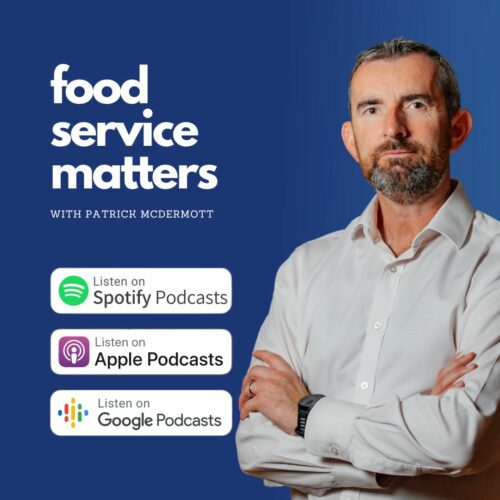
In the face of immense challenges due to increasing ingredient, energy and labour costs, many food service businesses are looking to reduce their spending, often finding no other solution but to cap salaries. However, using a little resourcefulness and creativity, costs can be tackled using approaches that won’t negatively impact workers or their careers in the food service industry.
In the fourth episode of the new Food Service Matters podcast, host Patrick McDermott interviews Zoe Watts, Managing Director of Bennett Hay, an independent food service company that specialises in the provision of food, event and reception services within office spaces.
Zoe shares some innovative strategies the business is implementing to combat rising costs, including initiatives to curb food waste and increase sustainability in the food service industry without resorting to salary capping.
Sourcing affordable ingredients
As food prices fluctuate wildly, Zoe says that Bennett Hay does its utmost to ensure seasonal and locally abundant ingredients are used throughout its kitchens. With this practice proving far more cost-effective and also sustainable, the aim is not to diverge from the company’s high standards. As Zoe explains, “We’ve had to really reinforce to our teams the importance of shopping around and ensure that they’re designing menus with no impact on quality.”
Another smart, sustainable sourcing solution comes from partnering with suppliers like Angry Monk, which provides surplus ‘imperfect’ fruit and vegetables. Using this kind of produce that might otherwise be thrown away, the company can choose ingredients to suit its budget and contribute positively to fighting food waste.
Crafting flexible menus
Apart from being savvy when sourcing produce, it’s important for the company to allow kitchen staff to take the reins and unleash their creativity. As Zoe highlights, “It’s about training our chefs and managers to be really flexible because price fluctuations are incredible.”
Rather than dictating set menus, Bennett Hays’ teams are empowered to use the most affordable and available ingredients at the time and come up with creative ways of incorporating them into their dishes.
Leveraging technology to increase efficiency
Another key strategy Zoe emphasises is that instead of lowering salaries, the company strives to make its staff and services more efficient, with technology playing a significant role.
“It’s not about capping or reducing salaries,” she asserts. “Rather, it’s about looking at how we can establish a more efficient team and still reward our people and pay them well for their work. And that’s where tech plays a huge part.”
Zoe explains that having fewer staff physically on site can help cut costs, and services such as self-checkout and preordering can allow for smaller teams while still meeting customer needs. What’s more, technology like digital menus can provide diners with sustainability information to influence their choices and minimise waste.
“It’s about getting the balance of really amazing tech without taking away the personal service,” she concludes.
As costs continue rising, the food service industry requires clever solutions to keep quality high and employees happy. To hear more about tackling this and similar issues in the food service industry, listen to Patrick’s full interview with Zoe Watts in the Food Service Matters podcast on Spotify, Apple Podcasts or Google Podcasts.
Patrick is CEO of DigiTally, which is playing an increasingly important role as an intuitive and interconnected simple Food Service software that helps save time, increase margins and combat food waste. Keen to learn more? Let’s talk! Book a 30-minute call with Patrick and get your demo set up today.



